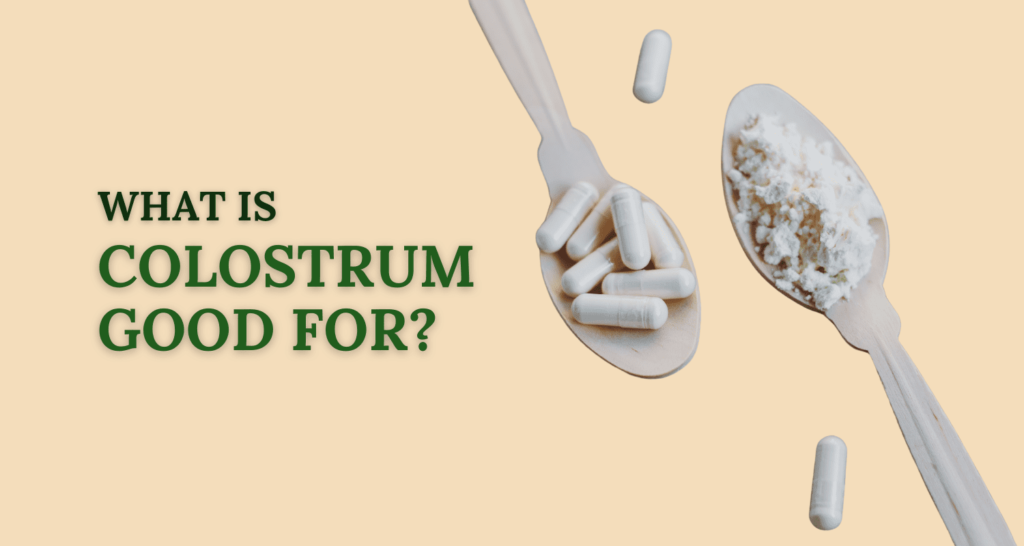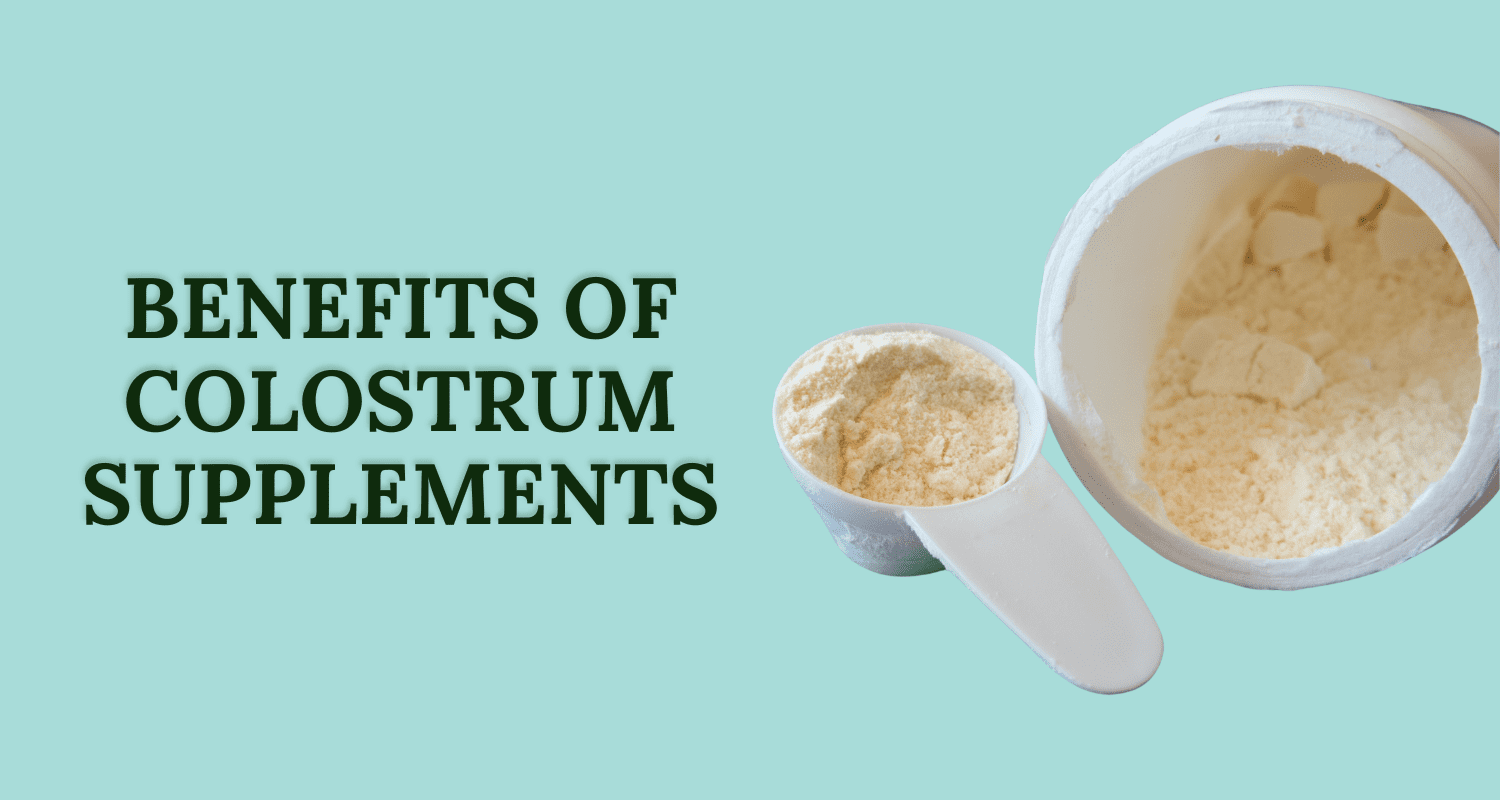Did you know that colostrum, the first milk produced by the breasts during pregnancy, is very special? It has two times as much protein as regular breast milk. This special milk is often called “liquid gold” because of its benefits. It’s full of protein, vitamins, minerals, and antibodies. These help build a baby’s immune system and keep them safe from infections.
Colostrum isn’t just for newborns. It’s good for adults too. It helps your immune system, acts against inflammation, and keeps your gut healthy. Whether you want to boost your immunity or better your gut, knowing about colostrum is key. In this article, we’ll explore the most burning question: what is colostrum good for newborns and adults?
Let’s explore: what is colostrum good for?
Key Takeaways
- Colostrum is a nutrient-dense “first milk” produced during pregnancy, high in protein, vitamins, minerals, and antibodies.
- What is colostrum good for? It gives critical support to the immune system of newborns and may help adults too.
- It helps the baby’s bodywork by controlling temperature, metabolism, and blood sugar.
- You can also get bovine (cow) colostrum as a supplement, which is similar to human colostrum.
- Colostrum is useful for young and adult pets, helping their growth and health.
What Is Colostrum?
Colostrum is the first milk made by the mammary glands in early pregnancy. It’s a thick, nutrient-packed fluid. This milk is rich in protein but has low amounts of fat and sugar. It’s filled with special elements like antibodies and various growth factors.
Composition and Nutrient Profile
Colostrum is full of nutrients, with a lot of protein. It has twice as much protein as ordinary breast milk. Also, colostrum is richer in zinc and copper, with four times more zinc and twice as much copper. These make it a powerhouse of important vitamins and minerals.
Differences from Mature Breast Milk
Colostrum and mature breast milk have some key differences. Colostrum has lower fat and sugar. This makes it easier for newborns to digest. It’s made this way to meet the specific needs of a baby in its first days of life.
Stages of Breast Milk Production
Pregnancy hormones, like progesterone, start the production of colostrum. After giving birth, when the placenta is out, the drop in progesterone levels tells the breasts to make more mature milk. This change happens over two to four days. Then, the milk gets more and changes into the next, more mature stage.
Colostrum Production and Breastfeeding
Colostrum is kick-started by pregnancy hormones like progesterone. When the placenta leaves the body after birth, there’s a rapid decrease in progesterone. This change triggers milk production, shifting from colostrum to mature breast milk.
Hormonal Changes During Pregnancy and Childbirth
While pregnant, hormones such as progesterone make the body produce colostrum at about 12 to 18 weeks. This special fluid collects in the breasts, getting them ready for breastfeeding. When the baby is born and the placenta is gone, progesterone levels suddenly drop. This tells the breasts to change from making colostrum to transitional and then mature milk.
Initiating Breastfeeding and Expressing Colostrum
It’s best to start breastfeeding right away, within the first 24 hours, to produce more colostrum. This early contact and nursing action send signals to the hormones that switch from colostrum to mature milk. If the baby can’t latch or the mother’s milk hasn’t started, colostrum can be hand-expressed and fed to the baby.
Bovine Colostrum as a Supplement
Besides human colostrum, bovine (cow) colostrum can be used as a supplement. They have a few differences, but they’re alike in many ways. Both have valuable nutrients and bioactive components.
Composition and Similarities to Human Colostrum
Bovine colostrum is rich in useful compounds like immunoglobulins and lactoferrin. These help with immunity and fighting off harmful microorganisms. They are key in the early growth of calf intestines. Human colostrum contains the same helpers, offering benefits to babies and grown-ups.
Potential Benefits and Uses
Studies show that taking bovine colostrum can boost health and performance. It’s been seen to help with body shape, recover after exercise, and strengthen the immune system. In addition, people are looking at its use for gut and respiratory health. It might even be used in formulas for premature babies.
Bovine colostrum is getting popular in the health and fitness world. Its active components and nutrition content show promise. They offer benefits from keeping the immune system strong to aiding athletic efforts.
Nutritional Benefits for Newborns
Colostrum is packed with nourishing elements for infants. It offers an array of important proteins, vitamins, and minerals. These are crucial for the babies’ growth and progress. It has a lot of proteins, like immunoglobulins and growth factors, which repair tissues and boost the immune system.
Rich in Proteins, Vitamins, and Minerals
It’s a powerhouse of vital nutrients for babies. Colostrum has double the protein of regular milk. Plus, it’s rich in vitamins A, magnesium, copper, and zinc. These components are essential for developing the immune system and growth.
Easy to Digest
Its lower fat and sugar content makes it simpler for infants to digest. Usually, babies need just 1 to 4 teaspoons of colostrum daily. This small amount gives them all the nutrition they need.
Supports Growth and Development
The special mix in colostrum, with high protein and growth factors, is key for a baby’s healthy development. These elements help in organ and tissue growth. Thus, they lay a solid groundwork for a baby’s future health.
Health Benefits for Adults
While colostrum is great for newborns, it helps adults too. It has parts that boost the immune system, like immunoglobulins and lactoferrin. These components can make the adult immune system stronger. This might lower the chances of getting sick.
Immune-Boosting Properties
Colostrum is highly valued for its benefits in protecting newborns. It’s packed with colostrum antibodies like IgA. These act as a shield against harmful invaders. Adding to its power are colostrum white blood cells, which are important for fighting off infections.
Antibodies and White Blood Cells
Immediately after birth, colostrum’s immunoglobulins like IgA offer babies a head start. They target and defeat bad germs, viruses, and more. The colostrum white blood cells in it also boost the baby’s immune growth, helping them fight off diseases.
Protection Against Infections
For newborns, colostrum’s ability to fight off infections is vital. Its antibodies and white blood cells form a tough defense. They guard against many sicknesses, supporting the baby’s early health and growth.
Potential Anti-Inflammatory Effects
Some studies hint colostrum might fight inflammation. In 2017, a study on athletes found taking bovine colostrum supplements lessened zonulin. Zonulin is linked to a leaky gut and more inflammation. So, colostrum could be good for gut health and soothing inflammation in adults.
Gastrointestinal Health
Besides helping the immune system and fighting off inflammation, colostrum is also good for the belly. Research hints that colostrum supplements might cut down episodes of acute diarrhea. They could also improve how well the gut works.
Colostrum for Pets
Colostrum isn’t just good for babies. It’s also great for animals both young and old. The immune-boosting nature and packed nutrients help babies of various animals, including puppies, kittens, and calves.
Benefits for Newborn Animals
For baby animals, colostrum is a must. It strengthens their immune system early on. High in immunoglobulins, like IgG, IgM, and IgA, colostrum shields them from many diseases. Some research even shows colostrum improving poop quality in young puppies.
Vet Dr. John Ellis believes colostrum might also lower gum disease bacteria in dogs. Oral health is key for a pet’s overall health.
Potential Uses for Adult Pets
Colostrum isn’t just for the young ones. It also helps adult pets. It aids in healing leaky gut syndrome and can tackle various diarrhea forms.
For dogs, colostrum might slow down aging by keeping muscles and bones strong. This helps senior pets with joint issues or arthritis.
Colostrum’s reach goes even further. It’s been shown to help with gut problems from drugs. And it boosts canine immune function before infections happen, cutting illness risk.
What Is Colostrum Good For?
Colostrum is known for its immune-boosting properties. It’s great for newborns and grown-ups alike. Colostrum has a lot of antibodies, white blood cells, and other things that boost your immune system. This helps protect you from sickness.
Immunity-Boosting Properties
The colostrum immune benefits have been studied a lot. It has lots of immunoglobulins (antibodies) and lactoferrin. These are important for making sure your immune system works well. They help fight off many kinds of bad germs.
Nutrient-Dense Superfood
Colostrum isn’t just good for your immune system. It’s extremely rich in nutrients, more than regular breast milk. It’s packed with proteins, vitamins, and minerals that help you grow strong. That’s why colostrum is called a “superfood.” It’s good for both babies and adults.
Potential Therapeutic Applications
Scientists are looking into other uses for colostrum, like fighting viruses and helping with cancer. It seems to do well in keeping your gut healthy too. The special compounds in colostrum might help with lots of health issues. So, it’s turning out to be a very useful and natural remedy.
Colostrum Management and Storage
Managing and storing colostrum correctly is key to keeping its quality high. Colostrum harvesting must happen quickly after birth. If it’s kept too long, its nutrients will drop. This means the good stuff in it, like immunoglobulins and growth factors, may decrease.
Harvesting and Handling
Dairy farmers need to be careful how they handle colostrum. Quick milking, using clean tools, and avoiding tough shaking or heat is vital. These steps keep the special compounds in colostrum alive, helping newborn calves get a healthy start.
Proper Storage Techniques
After harvest, colostrum storage is just as important. It should be kept very cold or frozen to stop germs and keep its health benefits. Store it in very clean, sealed containers, and don’t let it sit out too long. Checking its quality with special tools is smart, so farmers use it at its best.
Conclusion
What is colostrum good for? Colostrum is a beneficial substance that can provide numerous health benefits. Packed with essential nutrients and antibodies, colostrum helps boost the immune system, support healthy growth and development, and promote gut health.
It is especially beneficial for newborns, helping them fight off infections and establish a healthy gut microbiome. Overall, what is colostrum good for, colostrum is a valuable resource for maintaining overall health and well-being.
FAQs
What is colostrum good for?
Colostrum is beneficial for boosting the immune system, promoting gut health, and supporting growth and development.
What are the benefits of taking colostrum?
Taking colostrum can help improve immune function, enhance athletic performance, and aid in digestive health.
Is it safe to take colostrum every day?
Yes, it is generally safe to consume colostrum daily as a supplement, but it’s advisable to follow recommended dosage guidelines.
What are the disadvantages of colostrum?
Some potential disadvantages of colostrum include allergic reactions in sensitive individuals and the risk of contamination if not sourced from reputable sources.
When should I use colostrum?
Colostrum can be used as a supplement to support overall health, especially during times of increased physical activity or when seeking immune system support.
Is colostrum good for hair growth?
There’s limited scientific evidence supporting colostrum’s direct effect on hair growth, but its rich nutrient content may indirectly support overall hair health.
Disclaimer: This content, including advice, provides generic information only. It is not a substitute for a qualified medical opinion. Always consult a specialist or your doctor for more information. Nutrition Cult does not claim responsibility for this information.




